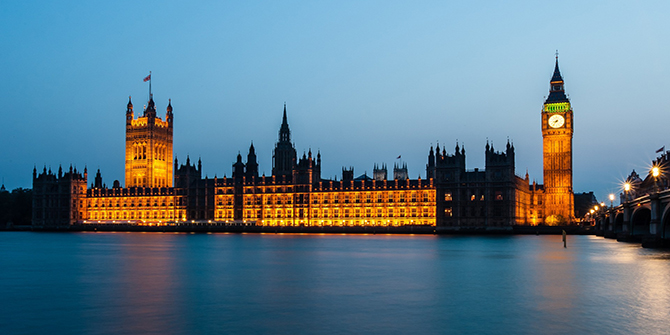
 Petra Schleiter and Thomas Fleming examine the power to prorogue Parliament. They outline the legal basis of prorogation, survey its uses in the UK and other Westminster systems, and discuss how the UK rules could be reformed.
Petra Schleiter and Thomas Fleming examine the power to prorogue Parliament. They outline the legal basis of prorogation, survey its uses in the UK and other Westminster systems, and discuss how the UK rules could be reformed.
The UK government has the power to suspend parliament, in a process known as ‘prorogation’. Prorogation is usually a routine measure, used to schedule gaps between sessions of parliament. But it became highly controversial in 2019, when the government tried to prorogue parliament for five weeks shortly before the scheduled Brexit date of 31 October. This decision caused uproar, and was ultimately quashed by the Supreme Court.
This controversy prompted discussion of whether the UK’s prorogation rules should be reformed. In particular, some have asked whether this power should be considered as part of the forthcoming review of the Fixed-term Parliaments Act 2011, which is legally required to take place this year. Here we outline the consequences of the current rules, showing that they are unusual, and suggesting possible ways for them to be reformed. Fuller versions of our arguments can be found in our recent articles in Political Quarterly and Parliamentary Affairs (forthcoming).
What are the consequences of the current prorogation rules?
Prorogation ends a parliamentary session. It means that neither House of Parliament may sit, and parliamentary business is almost entirely suspended. Though prorogation is formally a prerogative power of the monarch, she acts on the advice of the Prime Minister. In practice, therefore, the timing and length of prorogation are decided by the government. Parliament has no power to insist on sitting once it has been prorogued – only the government can shorten or prolong a prorogation.
This situation makes it possible for the government to use prorogation for political purposes when its interests conflict with those of parliament. Three such purposes stand out. First, the government might prorogue parliament to avoid facing a motion of no confidence. A prorogation of this kind caused significant controversy in Canada in 2008. Second, the government might use prorogation to pursue a policy for which there is no parliamentary support. Such motives appeared to underpin the controversial 2019 prorogation, which limited MPs’ ability to oppose the government’s policy of leaving the EU without a deal if none were agreed. Third, prorogation might be used to avoid the publication of politically embarrassing reports or documents. John Major was accused of this when a prorogation shortly before the 1997 general election delayed publication of a report into the ‘cash for questions’ scandal.
All of these possibilities are normatively undesirable. This is because they conflict with the essential principle underlying parliamentary democracy: executive accountability to parliament. In parliamentary systems like the UK, the government has no direct democratic mandate. Instead, its authority to govern rests on having the support of MPs. This gives parliament the right to scrutinize the government, and to remove it through a vote of no confidence if it wishes. But these rights cannot be exercised while parliament is suspended.
How unusual are these rules?
As well as being normatively undesirable, the UK’s current prorogation rules are highly unusual when compared to other European parliamentary democracies. Other ‘Westminster’ democracies, such as Canada or Australia, have very similar rules to the UK. But most European democracies give parliament the right to insist on sitting. Our analysis of rules in 26 other European democracies suggests that the overwhelming majority allow either the Speaker or a majority of MPs to call a sitting. Many countries even grant a similar power to a minority of MPs. Moreover, these rules are usually entrenched in national constitutions, which makes them hard to change. The European norm is therefore for parliaments to have constitutionally-enshrined protections against being suspended. The UK’s prorogation rules make it a significant outlier in this regard.
The UK’s prorogation rules are also unusual when considered in the context of recent trends within this country in the relationship between the government and parliament. The declining frequency of single-party majority governments, coupled with increasing rates of rebellion by backbenchers, have forced ministers to negotiate more with other parties and with their own MPs. Recent institutional changes also mean governments now face stronger select committees and a more assertive House of Lords. Finally, the Fixed-term Parliaments Act 2011 removed the prime minister’s power to call early elections, handing it to MPs instead. All of these changes have strengthened parliament at the expense of the government. The UK’s unreformed prorogation rules clearly stand out against this trend.
How could these rules be reformed?
The UK’s prorogation rules give the government troubling levels of power to sidestep parliament. This puts them out of step with other European parliamentary democracies, and with recent British trends in the relationship between government and parliament. Given this, how might the rules be changed?
Reforming the prorogation rules would require them to be formally codified in legislation. This is because prorogation is currently a prerogative power, so its limits and uses are not explicitly regulated in any one document. Such legislation could reduce the government’s control of prorogation in a number of ways. Most obviously, parliament could be given the power to prorogue and/or un-prorogue itself. Alternatively, any new legislation could set some explicit limits on the permitted length or purpose of prorogation. Comparing these two approaches, the latter has the downside of giving future MPs less flexibility to determine what constitutes an (un)acceptable prorogation.
Any reforms along these lines would have two potential benefits. Most importantly, they would limit the government’s ability to use prorogation as a tool for evading parliamentary scrutiny and accountability, or governing without the confidence of parliament. But they might also help to reduce future tension between ministers and judges. The government fiercely criticised the Supreme Court for their 2019 prorogation ruling. Giving MPs a direct role in shaping prorogation would reduce the need for similar court cases in the future.
_________
All articles posted on this blog give the views of the author(s), and not the position of LSE British Politics and Policy, nor of the London School of Economics and Political Science. Featured image credit: by Darv on Unsplash.







